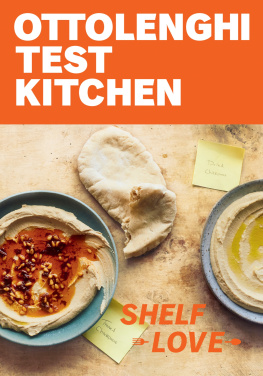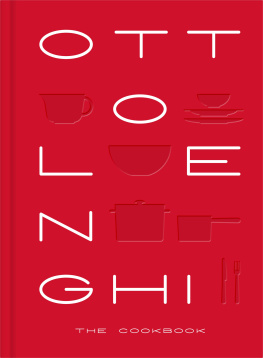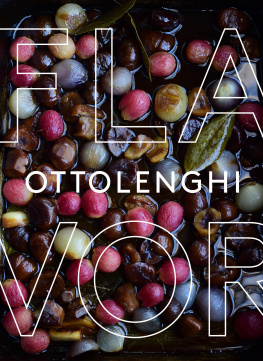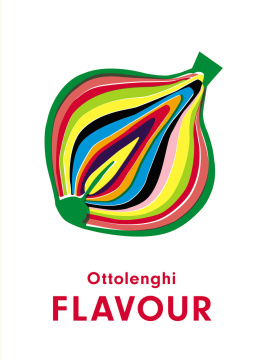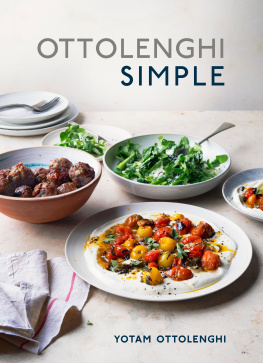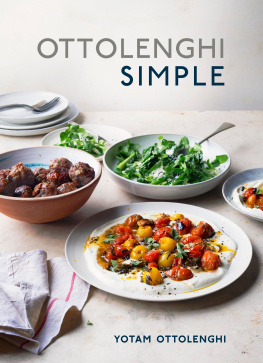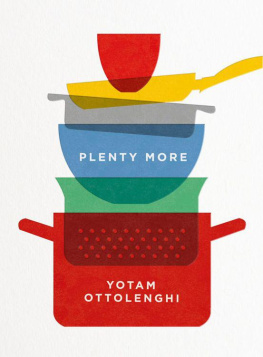CONTENTS
LIST OF RECIPES
A BOUT THE B OOK
Pandan leaves meet pomegranate seeds,star anise meets sumac and miso meets molassesin this collection of 120 new recipes fromYotam Ottolenghis London restaurant.
In collaboration with NOPIs head chef Ramael Scully,Yotams journey from the Middle East tothe Far East is one of big and bold flavours,with surprising twists along the way.
A BOUT THE A UTHOR
Yotam Ottolenghi is a cookery writer and chef-patron of the Ottolenghi delis and NOPI restaurant. He writes a weekly column in the Guardians Weekend magazine and has published four bestselling cookbooks: PLENTY and PLENTY MORE (his collection of vegetarian recipes) and, co-authored with Sami Tamimi, OTTOLENGHI: THE COOKBOOK and JERUSALEM. Yotam has made two Mediterranean Feasts series for More 4, along with a BBC4 documentary, Jerusalem on a Plate. www.ottolenghi.co.uk
Ramael Scully Scully was born in 1979 in Malaysia to a mother of Chinese and Indian heritage and a father with Malay and Irish blood. He moved to Sydney at the age of eight, with his mother and sister, where he went to school and then later to catering college. After several years cooking in Australia, Scully moved to London and started working at Ottolenghi Upper Street in 2005. He moved to the NOPI as head chef, when the restaurant opened in 2011. Scullys distinct culinary baggage the Malaysian flavours of his childhood, his training in the European tradition, his insatiable appetite for Asian ingredients has been the creative force behind much of what is on the NOPI menu.
I NTRODUCTION
If you happen to have any of my previous books Ottolenghi, Plenty, Jerusalem or Plenty More you will notice right away that the dishes in this book are somewhat more complex. Most of the recipes here will, therefore, be more challenging for home cooks. They are typically made up of a few distinct elements which need to be prepared separately, occasionally over a bit of time, before being put together on a plate at the very last minute.
I start with this disclaimer not in order to put anyone off I think the food here is spectacularly delicious and I am massively proud of it but because I want to make it clear that this is a restaurant cookbook: it features restaurant food. The vast majority of the recipes in my previous books were conceived in and for a domestic kitchen. The recipes here were created from a different frame of mind; that is, in an environment where a team of professional cooks labours for a few hours in preparation for a short pinnacle, the famous service, in which hundreds of dishes are served in short succession to a very large crowd. It is the complete opposite of the way we cook and eat at home.
The contrast between these two mind-sets is, really, the story of this book. What Ramael Scully (or just Scully, from now on, as thats what everybody calls him) and I have attempted to do is to modify and simplify NOPIs recipes without losing their essential core. We tried to keep a degree of complexity that does justice to food which is, by its very nature, complex, at the same time as allowing a non-professional to feel that this is an undertaking which is doable at home, delicious and gratifying.
The meeting of two distinctive worldviews also makes up the story of my relationship with Scully. I am telling it in detail here because it really is the story of the food that youll find in the following pages and how it came to be.
R ANDOM MEETING
Many of lifes most momentous moments stem from pretty random circumstances. My meeting with Scully is such a case. Well before I was even vaguely aware of the magical world of rasam, sambal and pandan, I met Scully on an ordinary trial shift on an ordinary day in the kitchen of Ottolenghi in Islington: a big man with a congenial smile, baffling cultural heritage and distinctive shuffling gait. Scully responded to what must have been the fifth online ad that Jim Webb, the head chef, had placed on Gumtree early in 2005, desperately looking for a senior chef de partie. His task would be to create a small menu of hot dishes served from the kitchen in the evening, alongside our familiar counter salads and cakes.
There was nothing unusual or particularly promising about this latest Aussie recruit; restaurant chefs tend to come and go quite regularly. Jim seemed to like him and that was good enough for me. Plus, with the chronic shortage of chefs in London, I couldnt really afford to be picky. And so Scully got the position and started training to run our evening service in the restaurant. After a few days, he seemed to be doing a decent job, though I can still remember a fleeting chat inside a walk-in fridge where Jim expressed certain concerns about Scullys experience and his efficiency during service. I suggested that we wait and see.
A few days later I got my first taste of Scullys food. He cooked, if my memory serves me right, portobello mushrooms braised in white wine, hard herbs and, in typical Scully fashion, tonnes of butter, and topped with pearled barley with feta and preserved lemon. He also served the crispest pork belly that had ever entered my mouth, with a sweet and sharp compote of plums, rhubarb, chilli, ginger and star anise. I was hooked!
Everything that is brilliant about Scullys cooking was there in those two dishes: his ability to combine ingredients with virtuosity and flair (preserved lemon, rosemary, feta and barley), his meticulousness in getting things just right (that heavenly crackling), his unreal generosity (a bottle of white wine in each of the dishes), his expertise and understanding of both Mediterranean and Asian cooking and his knack in blending them together thoughtfully, never willy-nilly, in a modern context.
Scullys food also fitted, almost perfectly (and I will explain this almost later), with the Ottolenghi way. The bold, surprisingly intense flavours that became synonymous with the name, the irreverent blends of ingredients, the vibrant colours on the plate, the generosity of spirit and big gestures, the curiosity and somewhat restless approach to food (always looking for the next ingredient, a fresh combination or a radically different method): all these were features we unmistakably had in common.
Within a few weeks of joining, Scully was running the evening section at Ottolenghi, constantly creating new recipes and new flavours, many of which I had been oblivious to before; he was serving our customers dishes ranging from squid with quinoa, smoked cherry tomatoes and Prosecco, to poppy seed tart with squash, goats cheese and carrot jam. And with the food came stories: the sambal was a hybrid of his mothers recipes with those of his many aunties; the duck confit was salted and left in fat for three months because thats the way it was done at Bathers Pavilion, the Sydney waterfront restaurant where Scully did his apprenticeship.


